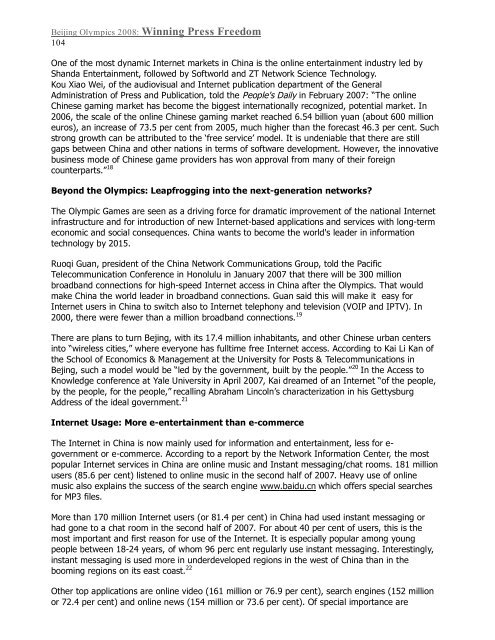Beijing Olympics 2008: Winning Press Freedom - World Press ...
Beijing Olympics 2008: Winning Press Freedom - World Press ...
Beijing Olympics 2008: Winning Press Freedom - World Press ...
Create successful ePaper yourself
Turn your PDF publications into a flip-book with our unique Google optimized e-Paper software.
<strong>Beijing</strong> <strong>Olympics</strong> <strong>2008</strong>: <strong>Winning</strong> <strong>Press</strong> <strong>Freedom</strong><br />
104<br />
One of the most dynamic Internet markets in China is the online entertainment industry led by<br />
Shanda Entertainment, followed by Softworld and ZT Network Science Technology.<br />
Kou Xiao Wei, of the audiovisual and Internet publication department of the General<br />
Administration of <strong>Press</strong> and Publication, told the People's Daily in February 2007: “The online<br />
Chinese gaming market has become the biggest internationally recognized, potential market. In<br />
2006, the scale of the online Chinese gaming market reached 6.54 billion yuan (about 600 million<br />
euros), an increase of 73.5 per cent from 2005, much higher than the forecast 46.3 per cent. Such<br />
strong growth can be attributed to the ‘free service’ model. It is undeniable that there are still<br />
gaps between China and other nations in terms of software development. However, the innovative<br />
business mode of Chinese game providers has won approval from many of their foreign<br />
counterparts.” 18<br />
Beyond the <strong>Olympics</strong>: Leapfrogging into the next-generation networks?<br />
The Olympic Games are seen as a driving force for dramatic improvement of the national Internet<br />
infrastructure and for introduction of new Internet-based applications and services with long-term<br />
economic and social consequences. China wants to become the world's leader in information<br />
technology by 2015.<br />
Ruoqi Guan, president of the China Network Communications Group, told the Pacific<br />
Telecommunication Conference in Honolulu in January 2007 that there will be 300 million<br />
broadband connections for high-speed Internet access in China after the <strong>Olympics</strong>. That would<br />
make China the world leader in broadband connections. Guan said this will make it easy for<br />
Internet users in China to switch also to Internet telephony and television (VOIP and IPTV). In<br />
2000, there were fewer than a million broadband connections. 19<br />
There are plans to turn Bejing, with its 17.4 million inhabitants, and other Chinese urban centers<br />
into “wireless cities,” where everyone has fulltime free Internet access. According to Kai Li Kan of<br />
the School of Economics & Management at the University for Posts & Telecommunications in<br />
Bejing, such a model would be “led by the government, built by the people.” 20 In the Access to<br />
Knowledge conference at Yale University in April 2007, Kai dreamed of an Internet “of the people,<br />
by the people, for the people,” recalling Abraham Lincoln’s characterization in his Gettysburg<br />
Address of the ideal government. 21<br />
Internet Usage: More e-entertainment than e-commerce<br />
The Internet in China is now mainly used for information and entertainment, less for e-<br />
government or e-commerce. According to a report by the Network Information Center, the most<br />
popular Internet services in China are online music and Instant messaging/chat rooms. 181 million<br />
users (85.6 per cent) listened to online music in the second half of 2007. Heavy use of online<br />
music also explains the success of the search engine www.baidu.cn which offers special searches<br />
for MP3 files.<br />
More than 170 million Internet users (or 81.4 per cent) in China had used instant messaging or<br />
had gone to a chat room in the second half of 2007. For about 40 per cent of users, this is the<br />
most important and first reason for use of the Internet. It is especially popular among young<br />
people between 18-24 years, of whom 96 perc ent regularly use instant messaging. Interestingly,<br />
instant messaging is used more in underdeveloped regions in the west of China than in the<br />
booming regions on its east coast. 22<br />
Other top applications are online video (161 million or 76.9 per cent), search engines (152 million<br />
or 72.4 per cent) and online news (154 million or 73.6 per cent). Of special importance are





